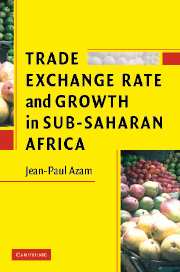General conclusion
Published online by Cambridge University Press: 26 May 2010
Summary
Much remains to be done to understand the macroeconomics of African economies. Nevertheless, this book has hopefully shown that some progress can be achieved. The method advocated here combines case studies, focusing on some salient events and policy changes, with analytical modeling and econometric testing, when possible. After all, the take-off of macroeconomics in the West was triggered by a similar concern, as Keynes was trying to understand why there was so much unemployment in Britain in the wake of the 1929 crisis; econometrics came later. Much relevant information is not captured by the statistician's net, and must be replaced by some kind of sophisticated guesswork, taking advantage of any available indirect observations. Equilibrium modeling is an important tool for self-discipline, and the validity of some of the assumptions made can be put to the test by evaluating how much of the available information can be accommodated in the story. The work of the macroeconomist is often akin to that of a detective, trying to find the relevant clues to choose among different possible models. There is not yet any better solution than going to visit the country that one wants to analyze, and trying to put the right questions to the right people. Bon voyage!
- Type
- Chapter
- Information
- Publisher: Cambridge University PressPrint publication year: 2006



